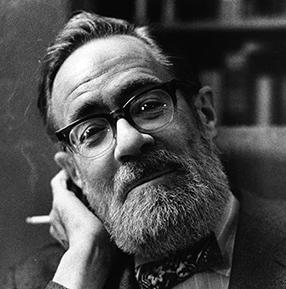 To John Berryman
To John Berryman
Via Santo Stefano Rotondo, 6
Rome. January 18, 1951
Dear Mr. Berryman,
It is seldom now that I read a book from cover to cover, as I have done yours; but your note mentioning Stickney as representing the opposite horn in the division of American letters from the one represented by Stephen Crane, interested me from the beginning, and still more the fact that you are a friend of Robert Lowell whose enigmatic person and career have preoccupied me strangely during the last few years. Might not your analysis of Crane (of whom I knew nothing) throw light on the problem of Lowell?
As to Crane, you have given me a clear impression, with which I am content for the purpose. He was a sensitive, half educated moral waif with a burdened imagination, proper to a Puritan in rebellion. Had he been well educated, like Stickney and like Oliver in my “Last Puritan,” he might not have drawn inspiration, as you show that Crane did, from primitive savage feelings, and his verses (which please me more than what “seem to” be his prose works) might have lost their power, as Stickney’s did. For Stickney was not at heart on the classic side. Classicism, and his French accomplishments and insights took the place for him of Puritanism in Crane. They disturbed and annoyed him, and incidentally, I suspect, made him afraid of me in his last period as a dangerous influence. He wanted to be a pure unpolluted whole-hearted American, tied to the mast like Ulysses; Europe and classicism were his Scylla and Carybdis. Now Lowell is well educated, self-educated in a great measure, and rebellious, but rebellious at the modern conventional America, yet getting his inspiration and his images, so far, exclusively from the American landscape and, as it were, from its margins, like French Canada and the Catholicism of W. 32nd Street. That he should have taken to Catholicism at all, a Boston Lowell, astonished me, and I was not surprised that he should have weakened in that direction. What Europe and native Catholicism will mean to him, I don’t know. I am myself an unbeliever and ready to resign everything that I care about, and clear the field for the next civilisation; but I was never passionate or angry with anything, so that the storms of the Crane and Lowell characters do not seem to me normal or likely to inspire important works. It is the ensuing calm, if we survive, that yields the true vision.
I am greatly obliged to you for your book and should like to learn more.
Yours sincerely, G Santayana
From The Letters of George Santayana: Book Eight, 1948-1952. Cambridge, MA: The MIT Press, 2008.
Location of manuscript: University of Minnesota Libraries, St. Paul, MN.
